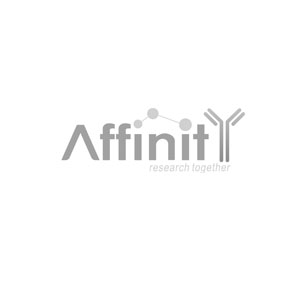FOXH1 Antibody - #AF0426
| Product: | FOXH1 Antibody |
| Catalog: | AF0426 |
| Description: | Rabbit polyclonal antibody to FOXH1 |
| Application: | WB IF/ICC |
| Reactivity: | Human, Mouse |
| Mol.Wt.: | 40kDa; 39kD(Calculated). |
| Uniprot: | O75593 |
| RRID: | AB_2834185 |
Related Downloads
Protocols
Product Info
*The optimal dilutions should be determined by the end user.
*Tips:
WB: For western blot detection of denatured protein samples. IHC: For immunohistochemical detection of paraffin sections (IHC-p) or frozen sections (IHC-f) of tissue samples. IF/ICC: For immunofluorescence detection of cell samples. ELISA(peptide): For ELISA detection of antigenic peptide.
Cite Format: Affinity Biosciences Cat# AF0426, RRID:AB_2834185.
Fold/Unfold
FAST 1; Fast 2; Fast-1; Fast-2; FAST1; Fast2; Forkhead activin signal transducer 1; Forkhead activin signal transducer 2; Forkhead box H1; Forkhead box protein H1; FOX H1; FOXH 1; FOXH1; FOXH1_HUMAN; hFAST 1; hFAST-1; hFAST1; Human homolog of Xenopus forkhead activin signal transducer 1; TGF beta/Activin signal transducer FAST1;
Immunogens
- O75593 FOXH1_HUMAN:
- Protein BLAST With
- NCBI/
- ExPASy/
- Uniprot
MGPCSGSRLGPPEAESPSQPPKRRKKRYLRHDKPPYTYLAMIALVIQAAPSRRLKLAQIIRQVQAVFPFFREDYEGWKDSIRHNLSSNRCFRKVPKDPAKPQAKGNFWAVDVSLIPAEALRLQNTALCRRWQNGGARGAFAKDLGPYVLHGRPYRPPSPPPPPSEGFSIKSLLGGSGEGAPWPGLAPQSSPVPAGTGNSGEEAVPTPPLPSSERPLWPLCPLPGPTRVEGETVQGGAIGPSTLSPEPRAWPLHLLQGTAVPGGRSSGGHRASLWGQLPTSYLPIYTPNVVMPLAPPPTSCPQCPSTSPAYWGVAPETRGPPGLLCDLDALFQGVPPNKSIYDVWVSHPRDLAAPGPGWLLSWCSL
PTMs - O75593 As Substrate
| Site | PTM Type | Enzyme | Source |
|---|---|---|---|
| S265 | Phosphorylation | Uniprot | |
| S266 | Phosphorylation | Uniprot |
Research Backgrounds
Transcriptional activator. Recognizes and binds to the DNA sequence 5'-TGT[GT][GT]ATT-3'. Required for induction of the goosecoid (GSC) promoter by TGF-beta or activin signaling. Forms a transcriptionally active complex containing FOXH1/SMAD2/SMAD4 on a site on the GSC promoter called TARE (TGF-beta/activin response element).
Nucleus.
Ubiquitous.
Interacts with the MH2 domains of SMAD2 and SMAD3.
The FM region is required for binding SMAD2/SMAD4 complexes. FM2 is more effective than FM1 and only interacts with phosphorylated SMAD2 that is in an activated SMAD complex (By similarity).
Restrictive clause
Affinity Biosciences tests all products strictly. Citations are provided as a resource for additional applications that have not been validated by Affinity Biosciences. Please choose the appropriate format for each application and consult Materials and Methods sections for additional details about the use of any product in these publications.
For Research Use Only.
Not for use in diagnostic or therapeutic procedures. Not for resale. Not for distribution without written consent. Affinity Biosciences will not be held responsible for patent infringement or other violations that may occur with the use of our products. Affinity Biosciences, Affinity Biosciences Logo and all other trademarks are the property of Affinity Biosciences LTD.
